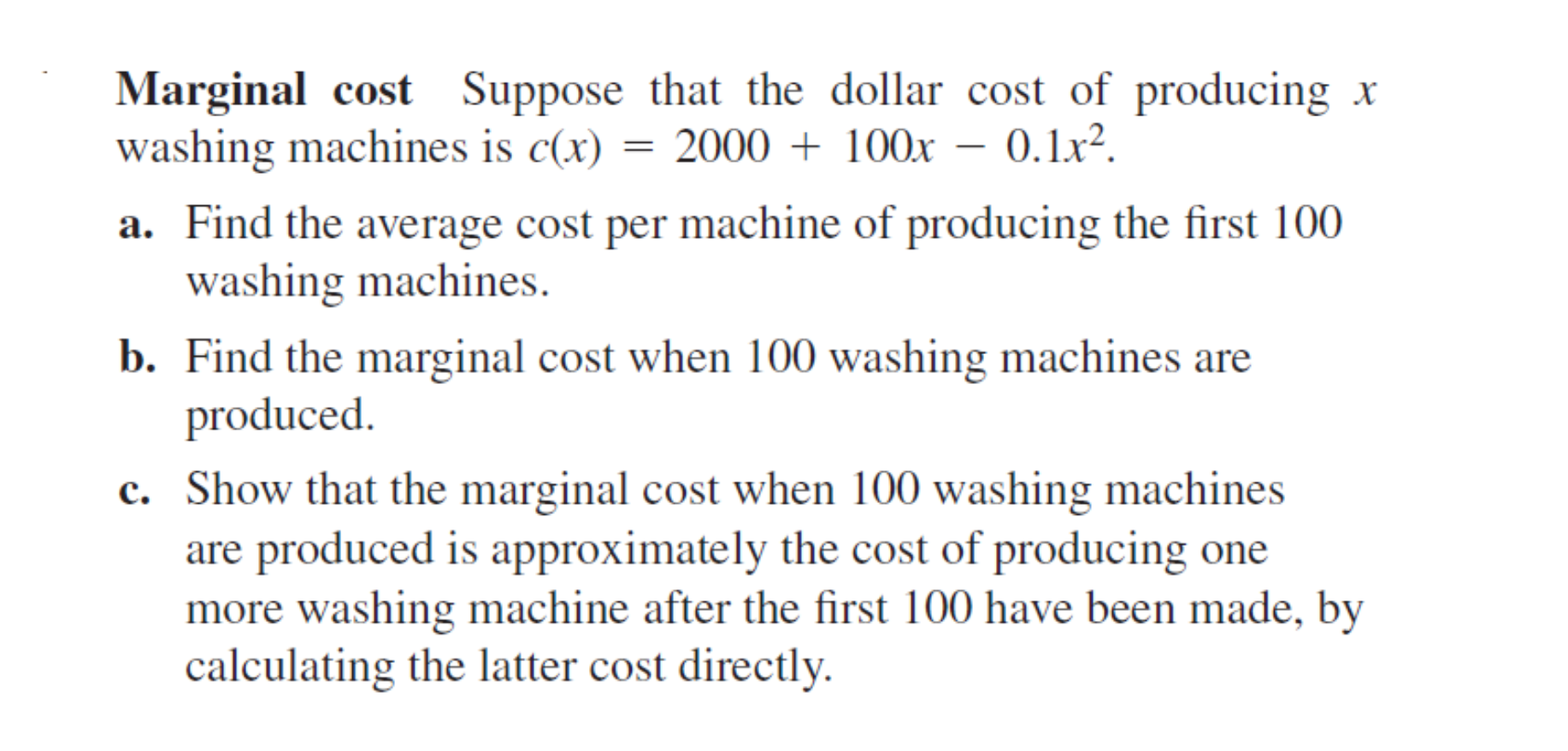Marginal cost: Suppose that the dollar cost of producing x washing machines is c(x) = 2000 + 100x - 0.1x^2. a. Find the average cost per machine of producing the first 100 washing... Marginal cost: Suppose that the dollar cost of producing x washing machines is c(x) = 2000 + 100x - 0.1x^2. a. Find the average cost per machine of producing the first 100 washing machines. b. Find the marginal cost when 100 washing machines are produced. c. Show that the marginal cost when 100 washing machines are produced is approximately the cost of producing one more washing machine after the first 100 have been made, by calculating the latter cost directly.

Understand the Problem
The question is asking us to find the average cost per washing machine produced, the marginal cost at a specific production level, and to demonstrate the relationship between marginal costs and the cost of producing additional units after a certain threshold. The task involves calculations based on the provided cost function.
Answer
The average cost is $110$, the marginal cost is $80$, and the cost of producing one more machine after 100 is approximately $79.9$.
Answer for screen readers
a. The average cost per machine of producing the first 100 washing machines is $110$.
b. The marginal cost when 100 washing machines are produced is $80$.
c. The cost of producing one more machine after the first 100 is approximately $79.9$.
Steps to Solve
- Find the total cost for 100 washing machines
First, we substitute $x = 100$ into the cost function $c(x) = 2000 + 100x - 0.1x^2$:
[ c(100) = 2000 + 100(100) - 0.1(100)^2 ]
Calculating this gives:
[ c(100) = 2000 + 10000 - 1000 = 11000 ]
- Calculate the average cost
The average cost per washing machine is calculated using the formula:
[ \text{Average Cost} = \frac{c(100)}{100} ]
Substituting the total cost we found:
[ \text{Average Cost} = \frac{11000}{100} = 110 ]
- Find the marginal cost at 100 washing machines
To find the marginal cost, we need to take the derivative of the cost function $c(x)$:
[ c'(x) = \frac{d}{dx}(2000 + 100x - 0.1x^2) = 100 - 0.2x ]
Now substitute $x = 100$ to find the marginal cost:
[ c'(100) = 100 - 0.2(100) = 100 - 20 = 80 ]
- Calculate the total cost for 101 washing machines
To show that the marginal cost at 100 washing machines is approximately the cost of producing one more, calculate $c(101)$:
[ c(101) = 2000 + 100(101) - 0.1(101)^2 ]
Calculating this gives:
[ c(101) = 2000 + 10100 - 0.1(10201) = 2000 + 10100 - 1020.1 \approx 11079.9 ]
- Calculate the cost of the additional machine
Now we find the cost of producing the additional washing machine:
[ \text{Cost of 101st machine} = c(101) - c(100) = 11079.9 - 11000 = 79.9 ]
a. The average cost per machine of producing the first 100 washing machines is $110$.
b. The marginal cost when 100 washing machines are produced is $80$.
c. The cost of producing one more machine after the first 100 is approximately $79.9$.
More Information
The average cost tells us how much each washing machine costs when producing a batch. Marginal cost reflects the cost of making one additional unit, which is an important concept in economics for understanding production efficiency and cost management.
Tips
- Failing to correctly differentiate the cost function to find the marginal cost.
- Miscalculating the total costs at $c(100)$ or $c(101)$, which can lead to incorrect average and marginal costs.
AI-generated content may contain errors. Please verify critical information